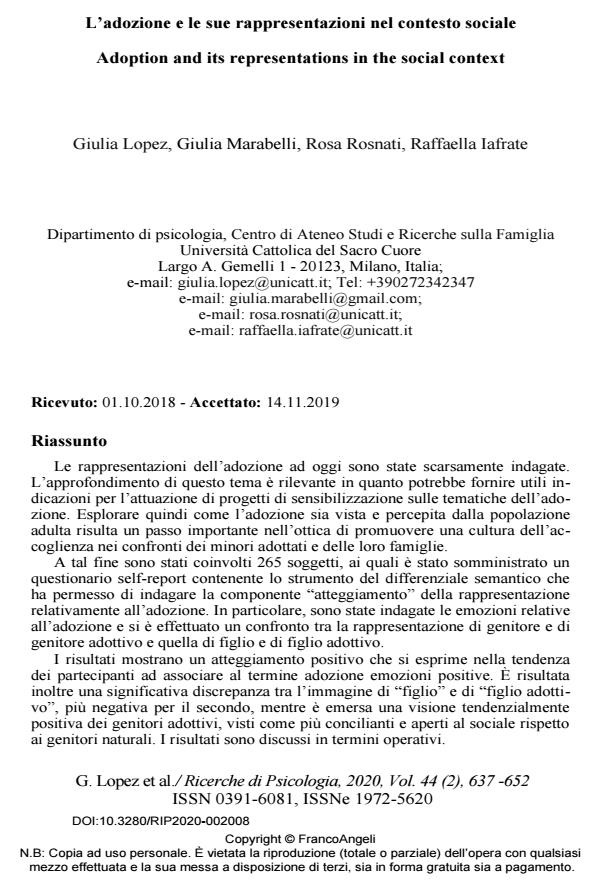Adoption and its representations in the social context
Journal title RICERCHE DI PSICOLOGIA
Author/s Giulia Lopez, Giulia Marabelli, Rosa Rosnati, Raffaella Iafrate
Publishing Year 2020 Issue 2020/2
Language Italian Pages 16 P. 635-650 File size 266 KB
DOI 10.3280/RIP2020-002008
DOI is like a bar code for intellectual property: to have more infomation
click here
Below, you can see the article first page
If you want to buy this article in PDF format, you can do it, following the instructions to buy download credits

FrancoAngeli is member of Publishers International Linking Association, Inc (PILA), a not-for-profit association which run the CrossRef service enabling links to and from online scholarly content.
The representations of adoption at date have been little investigated. The deepening of this topic would be relevant as it could provide useful implications for intervention to implement a culture of hospitality. Therefore, exploring how adoption is seen and perceived by the adult population is an important step in promoting a context able to welcome and support adoptive children and their families. To this aim, 265 subjects were involved, and filled in a self-report ques-tionnaire containing the semantic differential to investigate the attitude compo-nent of the representation concerning adoption. In particular we explore the emotions connected to adoption and the comparison between the representation of parent and adoptive parent, and between the child and the adoptive child. Results show a positive attitude as participants tend to associate positive emotions to adoption. It also turned out a discrepancy between the representation of "child" and "adoptive child", in the direction of the disadvantage of the latter, while a tendentially positive vision of adoptive parents emerged, perceived as more conciliatory and open to the social context than biological parents. The results are discussed in terms of implication for practise.
Keywords: Representation, adoptive parent, adoptive child, social context, semantic differential.
- The Birth Parents’ Representation by Prospective Adoptive Parents Couples Ondina Greco, Ivana Comelli, Serena Pietragalla, in Adoption Quarterly /2022 pp.373
DOI: 10.1080/10926755.2022.2077873 - Unpacking Beliefs and Representations Surrounding Adoptive Families in Italy Laura Gorla, Chiara Fusco, Alessandra Santona, in Adoption Quarterly /2024 pp.1
DOI: 10.1080/10926755.2024.2419641
Giulia Lopez, Giulia Marabelli, Rosa Rosnati, Raffaella Iafrate, L’adozione e le sue rappresentazioni nel contesto sociale in "RICERCHE DI PSICOLOGIA " 2/2020, pp 635-650, DOI: 10.3280/RIP2020-002008